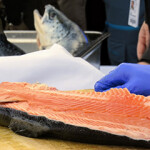NOAA Fisheries report identifies IUU in Ecuador, Mexico, South Korea

NOAA Fisheries has released its 2019 report to the U.S. Congress, identifying the organization’s efforts to combat illegal, unreported, and unregulated (IUU) fishing internationally while also rebuking three countries for lack of sufficient enforcement against IUU.
The biennial report on improving international fisheries management – made to Congress as part of the High Seas Driftnet Fishing Moratorium Protection Act – identified Ecuador, Mexico, and the Republic of Korea has three countries that failed to sufficiently comply with agreed-upon regulations related to IUU. The report also credited Ecuador, Mexico, and the Russian Federation for earlier work to react to IUU allegations made in NOAA’s 2017 report to congress.
Ecuador had earlier been identified by NOAA for having 25 vessels with violations of the Inter-American Tropical Tuna Commission (IATTC) resolutions, which were made in 2014, 2015, and 2016. Several of the vessels, the report states, were “repeat offenders.” At the time, Ecuador was notified through the U.S. Department of State about the IUU activity.
Following that notification, Ecuador provided documents and took corrective actions that were sufficient enough for NOAA to make a positive certification determination for the country.
However, the country has continued to have vessels that violate IATTC resolutions, and according to the NOAA the country hasn’t taken sufficient steps to investigate potential offenses, including violations of protections for sea turtles and tuna discards.
“Specifically, it appears that Ecuador’s actions were limited to review of observer documents related to the allegation. If the observer forms in question were left blank, Ecuador apparently concluded there was no violation,” the NOAA report states.
Mexico, as well, was given both praise for reaction to past instances of IUU and was identified as continuing to allow IUU. In the 2017 report, the country as identified for having vessels fishing without authorization in U.S. waters, typically red snapper fished illegally in the United States’ Exclusive Economic Zone (EEZ) in the Gulf of Mexico.
Since the identification, according to the NOAA report, the country has provided details of their enforcement against the offending vessels, as well as providing evidence of the charges brought against the vessels that participated in IUU. Those efforts led to a positive certification determination for Mexico.
However, the same problems are still continuing, according to NOAA. Vessels are still fishing illegally in U.S. waters in the Gulf of Mexico for red snapper in similar numbers.
“These vessels are known to have deleterious effects on finfish stocks, including red snapper, as well as bycatch of protected sea turtles,” the NMFS report states. “NOAA, the National Parks Service, and the Texas Parks and Wildlife Department have reported significant strandings of turtles on beaches in Texas, likely the result of bycatch by Mexican vessels illegally fishing in U.S. waters.”
Mexico is taking efforts to stop the IUU, with increasing numbers of prosecutions and fines imposed on Mexican nationals found guilty of fishing in U.S. waters. However, the fines have not seemed to stem the tide of IUU boats, according to the NOAA report.
“Based on consultations with Mexico on this issue, it appears that while control of, and compliance by, the licensed fleet may have improved, there continues to be an unlicensed fleet that operates without meaningful monitoring or control by Mexico,” the NMFS report states.
The IUU fishing is of particular concern to the U.S. due to the volume of fresh and frozen snapper – the main species being caught illegally – that the country imports each year from Mexico. In 2018, the U.S. imported 4,796,693 kilograms of red snapper from the country, with a declared value of slightly more than USD 33 million (EUR 30 million). The concern is some of that amount could have included fish illegally caught in U.S. waters.
An additional issue is the amount of money the U.S. spends fighting Mexican IUU.
“The United States, particularly the [United States Coast Guard], consistently expends considerable resources and assumes significant operational risk to locate, deter and interdict these vessels,” the NMFS report states.
The NMFS is looking for some sort of measurable change to the amount of incursions by Mexican vessels.
The one country that wasn’t both certified and then rebuked was the Russian Federation. In the 2017 report, the Russian Federation was identified due to vessels violating rules in the Commission for Conservation of Antarctic Marine Living Resources (CCAMLR).
After being notified by the U.S. Department of State, the Russian Federation met with intergovernmental committees and resolved the issues by opening investigations into all IUU cases, and disclosing all information found to stakeholders. Through the process, Russia punished those found violating the CCAMLR, and further provided recommendations to prevent further issues.
Those steps were sufficient enough that NOAA made a positive certification determination for the Russian Federation, and the country was not mentioned again in the 2019 report.
One country was added to the offending list in 2019: The Republic of Korea. The U.S. has filed a complaint for the first time against South Korea in response to the country’s lack of action against IUU activities.
Two vessels flagged to South Korea – Hong Jin No. 701 and Southern Ocean – violated CCAMLR conservation measures in 2017, according to NOAA, and the country failed to take effective actions against the violations. The report states that while South Korea has robust criminal penalties, it does not include administrative or civil remedies.
“Therefore, when the prosecutor declines prosecution due to insufficient evidence that the violation was intentional (Hong Jin No. 701), or suspends the indictment (Southern Ocean), there are no other mechanisms available for addressing violations or depriving the violators of the economic benefit of their illegal activity,” the NMFS states.
Violators who have been suspected of IUU but not prosecuted can go on to benefit from the illegal activity, as Korean law has no methods of seizing property prior to a conviction.
China, as well, was mentioned in the report but did not get a specific identification. NOAA listed out a series of “concerns’” with China’s fishing practices, including the “significant public reports of alleged illegal fishing by Chinese-flagged vessels in the EEZs of other nations.”
The report lists multiple incidents in Argentina’s EEZ, including one vessel that was sunk by the Argentine Coast Guard after it tried to collide and flee from official ships. Argentina’s Coast Guard has opened fire on Chinese-flagged vessels in the past, and the country has issued capture orders on multiple ships that have fled the region.
Chinese-flagged vessels have caused issues in other countries as well. In 2017, Sengalese authorities detained seven Chinese-flagged vessels; eight other vessels were detained in Guinea, Sierra Leone, and Guinea Bissau; Chinese-flagged vessels were found fishing illegally in Vanuatu and Micronesia; and the Ecuadorian Coast Guard detained a vessel in the waters of the Galapagos Islands Marine Reserve and discovered 300 tons of illegally caught fish.
Despite the incidents, NOAA fisheries decided not to list China alongside the others due to the specific definitions in the Moratorium Protection Act that mandates the report.
“After careful analysis, NOAA has determined these particular allegations do not meet the current definition of IUU fishing for the purposes of identification under the MPA and its implementing regulations,” the report states. “NOAA will engage with China to seek information on its efforts to exercise responsible flag state control over its distant water fishing vessels and to confirm that it is taking the necessary steps to ensure compliance by its fleet. We will also continue to take steps to ensure that the United States is not importing seafood derived from this type of IUU fishing activity.”






Share